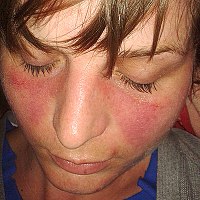
Distinguishing apathy from depression: A review differentiating the behavioral, neuroanatomic, and treatment‐related aspects of apathy from depression in neurocognitive disorders
Sign Up to like & getrecommendations! Published in 2023 at "International Journal of Geriatric Psychiatry"
DOI: 10.1002/gps.5882
Abstract: This narrative review describes the clinical features of apathy and depression in individuals with neurocognitive disorders (NCDs), with the goal of differentiating the two syndromes on the basis of clinical presentation, diagnostic criteria, neuropathological features,… read more here.
Keywords: distinguishing apathy; depression; neurocognitive disorders; apathy depression ... See more keywords

The Evolving Role of Specialized Pro-resolving Mediators in Modulating Neuroinflammation in Perioperative Neurocognitive Disorders.
Sign Up to like & getrecommendations! Published in 2019 at "Advances in experimental medicine and biology"
DOI: 10.1007/978-3-030-21735-8_4
Abstract: Surgery can be a life-saving procedure; however, significant complications may occur after routine procedures especially in older and more frail patients. Perioperative neurocognitive disorders (PNDs), including delirium and postoperative cognitive dysfunction, are the most common… read more here.
Keywords: specialized pro; perioperative neurocognitive; pro resolving; role ... See more keywords

Childhood maltreatment and HIV-associated neurocognitive disorders share similar pathophysiology: a potential sensitisation mechanism?
Sign Up to like & getrecommendations! Published in 2017 at "Metabolic Brain Disease"
DOI: 10.1007/s11011-017-0062-9
Abstract: AbstractHIV-associated neurocognitive disorders (HAND) are increasingly prevalent despite the use of antiretroviral therapies. Previous research suggests that individual host factors play an important role in determining susceptibility to HAND. In this review, we propose that… read more here.
Keywords: share; childhood; hand; neurocognitive disorders ... See more keywords

A mouse model of HIV-associated neurocognitive disorders: a brain-behavior approach to discover disease mechanisms and novel treatments
Sign Up to like & getrecommendations! Published in 2017 at "Journal of NeuroVirology"
DOI: 10.1007/s13365-017-0572-6
Abstract: HIV-associated neurocognitive disorders (HAND) remain highly prevalent despite combined antiretroviral therapy (cART). Although the most common forms of HAND are mild and identified through neuropsychological testing, there is evidence that with aging these mild forms… read more here.
Keywords: hiv; hand; model; neurocognitive disorders ... See more keywords

A candidate gene study of intermediate histopathological phenotypes in HIV-associated neurocognitive disorders
Sign Up to like & getrecommendations! Published in 2020 at "Journal of NeuroVirology"
DOI: 10.1007/s13365-020-00846-z
Abstract: HIV-associated neurocognitive disorders (HAND) describe a spectrum of neuropsychological impairment caused by HIV-1 infection. While the sequence of cellular and physiological events that lead to HAND remains obscure, it likely involves chronic neuroinflammation. Host genetic… read more here.
Keywords: neurocognitive functioning; study; hand; neurocognitive disorders ... See more keywords

The psychological and cognitive impact of Covid-19 on individuals with neurocognitive impairments: research topics and remote intervention proposals
Sign Up to like & getrecommendations! Published in 2020 at "Aging Clinical and Experimental Research"
DOI: 10.1007/s40520-020-01637-6
Abstract: The novel coronavirus (Covid-19) that emerged in Wuhan, China, in December 2019 rapidly spread within Hubei province, and by January 30, 2020 had extended to up to 20 countries. Highly contagious and dangerous, Covid-19 quickly… read more here.
Keywords: psychological cognitive; neurocognitive disorders; population; research topics ... See more keywords

Automated diagnosis of HIV-associated neurocognitive disorders using large-scale Granger causality analysis of resting-state functional MRI
Sign Up to like & getrecommendations! Published in 2019 at "Computers in biology and medicine"
DOI: 10.1016/j.compbiomed.2019.01.006
Abstract: HIV-associated neurocognitive disorders (HAND) represent an important source of neurologic complications in individuals with HIV. The dynamic, often subclinical, course of HAND has rendered diagnosis, which currently depends on neuropsychometric (NP) evaluation, a challenge for… read more here.
Keywords: large scale; hiv; brain; neurocognitive disorders ... See more keywords

Behavioral Symptoms as Predictor Factor of Disease Progression Across Different Neurocognitive Disorders. A Longitudinal Study
Sign Up to like & getrecommendations! Published in 2017 at "European Psychiatry"
DOI: 10.1016/j.eurpsy.2017.01.1130
Abstract: Background Previous works highlight the importance of neurocognitive symptoms over cognitive and functional dependency in neurocognitive disorders. However, little is known regarding to what extent presence of neuropsychiatric symptoms predicts disease progression, cognitive and functional… read more here.
Keywords: behavioral symptoms; bvftd; disease; disease progression ... See more keywords

Health-related Quality of Life in Old Age Institutionalized Patients with Neurocognitive Disorders
Sign Up to like & getrecommendations! Published in 2017 at "European Psychiatry"
DOI: 10.1016/j.eurpsy.2017.01.1132
Abstract: Health-related quality of life (HRQOL) is an important indicator of how a patient perceives hi/her own physical and mental status. Evaluating this dimension in old age patients which are institutionalized for neurocognitive disorders is useful… read more here.
Keywords: health related; hrqol; old age; related quality ... See more keywords

HMGB1/anti-HMGB1 antibodies define a molecular signature of early stages of HIV-Associated Neurocognitive Disorders (HAND)
Sign Up to like & getrecommendations! Published in 2017 at "Heliyon"
DOI: 10.1016/j.heliyon.2017.e00245
Abstract: Background HIV-associated neurocognitive disorders (HAND) persist in the post-HAART era, characterized by asymptomatic neurocognitive impairment (ANI) and mild neurocognitive disorders (MND). High mobility group box 1 (HMGB1) is a non-histone chromosomal protein widely expressed in… read more here.
Keywords: hmgb1; hmgb1 igg; anti hmgb1; hand ... See more keywords

HIV-Associated Neurocognitive Disorders: A Global Perspective
Sign Up to like & getrecommendations! Published in 2017 at "Journal of the International Neuropsychological Society"
DOI: 10.1017/s1355617717001102
Abstract: Abstract The present review on HIV-associated neurocognitive disorders (HAND) provides a worldwide overview of studies that have investigated the rate and neuropsychological (NP) profile of HAND research since the inception of the 2007 HAND diagnostic… read more here.
Keywords: hiv; hand; neurocognitive disorders; associated neurocognitive ... See more keywords